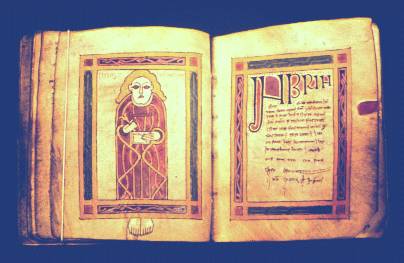 Time and Location
Time and Location
Tuesdays 10:40-11:30 AM; Thursdays 10:40-12:35 AM
Flint 119
Description
“The past is a foreign country.” There is perhaps no period in history to which the words of the American historian David Lowenthal may apply better than to the Early Middle Ages. The early part makes it exotic: it is not about gallant knights, courtly love, or crusaders, all of which “happened” much later, after AD 1000. By contrast, this was a world of warriors and missionaries, though the names of Beowulf and Boniface may not be as familiar to you as those of King Arthur and Joan of Arc. Moreover, the study of the Early Middle Ages presents a number of serious challenges, especially the combination of written sources and archaeological evidence. In fact, the lack of written sources explains why some historians refer to the early Middle Ages as the Dark Ages. In this course, we will examine some of these problems and attempt to present, if not a definite picture, then at least a survey of the current knowledge on this topic. Our focus will be on social and cultural history, our approach chronological and sometimes thematic. From Huns to Vikings, we will bring some light into the study of the Dark Ages.
Textbooks
- Roger Collins. Early Medieval Europe, 300-1000. 3d edition,. New York: Palgrave MacMillan, 2010; on two-hour reserve in Library West [hereafter Collins]
- Alfred J. Andrea. The Medieval Record. Sources of Medieval History. 2nd edition. Indianapolis/Cambridge: Hackett, 2020 [hereafter Andrea].
- Byzantium: Church, Society, and Civilization Seen Through Contemporary Eyes. Ed. by Deno John Geanakoplos. Chicago: University of Chicago Press, 1984; on two-hour reserve in Library West [hereafter Geanakoplos]
Assignments
There is no attendance policy, but you are responsible for attending all lectures and reading the required texts. Class participation may be taken into account to determine the overall grade. The basis for evaluation of performance will be four quizzes and two exams (Midterm and Final). The unannounced quizzes are exclusively based on primary source readings from your Andrea and Byzantium books, as well as from the Internet Medieval Sourcebook. All quizzes will consist only of questions (no essay). A careful study of these texts is necessary for a good performance at the quiz. The Midterm and Final exams will cover everything from lectures and readings. Both Midterm and Final will consist of two parts: an identification and/or multiple-choice part, and a short essay, in which you will be asked to synthesize your knowledge of the topic, dropping in facts to show that you understand the concrete aspects of that topic. Only the Midterm will be cumulative. In other words, the Final examination will cover only the material since the Midterm examination. Make-up Midterm and Final exam will be given for very serious reasons. There is no make-up for quizzes. Extra-credit work will be accepted only for students with active participation in class discussions. The format of the extra-credit option shall be discussed with the instructor during regular office hours. The following point-system will be used in determining the final grade:
Quizzes: 40 points
Midterm: 30 points
Final exam: 30 points
Total: 100 points
Grades:
| Points | Grade |
| 95-100 | A |
| 90-94 | A- |
| 87-89 | B+ |
| 81-86 | B |
| 75-80 | B- |
| 68-74 | C+ |
| 61-67 | C |
| 55-60 | C- |
| 48-54 | D+ |
| 41-47 | D |
| 35-40 | D- |
| under 30 | E |